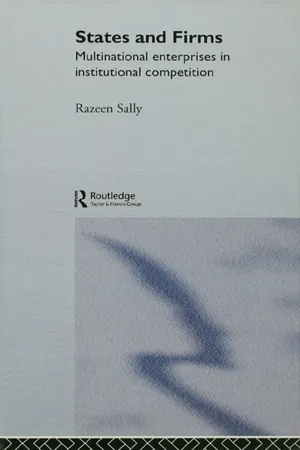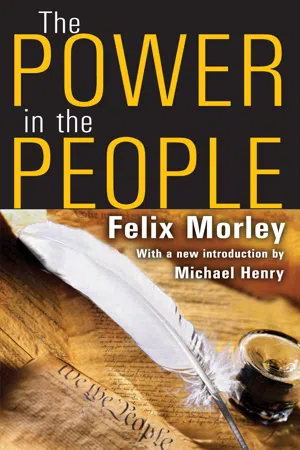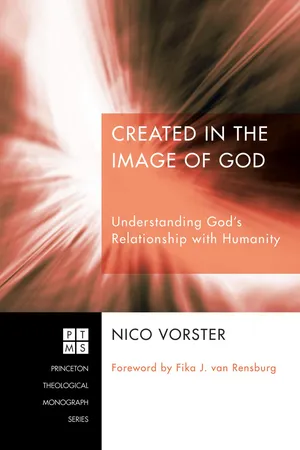Politics & International Relations
Free Enterprise
Free enterprise refers to an economic system where businesses are privately owned and operate for profit with minimal government intervention. It allows for competition, innovation, and individual initiative, and is characterized by the principles of supply and demand, consumer choice, and entrepreneurship. In a free enterprise system, individuals have the freedom to start, operate, and grow their own businesses.
Written by Perlego with AI-assistance
Related key terms
Related key terms
1 of 4
Related key terms
1 of 3
3 Key excerpts on "Free Enterprise"
- eBook - ePub
- Razeen Sally(Author)
- 2013(Publication Date)
- Routledge(Publisher)
1 INTRODUCTION: POLITICAL ECONOMY AND THE MULTINATIONAL ENTERPRISEThis study has as its primary actor the multinational enterprise (MNE), which can be defined as an economic unit that operates across national boundaries, producing in at least one other foreign country as well as in its home market. International production, the value-adding activity (research, development, design, engineering, manufacturing, distribution, sales) owned, controlled and organised by a firm outside its national boundaries, is thus the essence of multinationality.1 The MNE can be studied from many different angles and perspectives, each with roots in one or a number of academic disciplines in the social sciences. Chief among them are international economics, management organisation, economic and business history, law and, last but not least, political science. The approach utilised here has its roots in the field of institutional political economy, much influenced by the concepts and tools of political science, and it is with such distinctive political economy lenses that the multinational enterprise is constantly viewed.Political economy is intrinsically interdisciplinary, in so far as it represents a fusion of political science and economics. According to Robert Gilpin it is ‘the reciprocal and dynamic interaction between the realm of wealth and the realm of power’. Both Gilpin and Susan Strange see it as the interaction of the ‘state’ and the ‘market’. In Charles Lindblom’s influential work Politics and Markets, it is the interplay between ‘authority’ and ‘market’.2At all events such political economy scholarship has continually focused on the role of government, that is, the ‘state’, in both domestic nation-state and international economic affairs. For analysts in the burgeoning field of international political economy, ‘what governments do’ is studied in terms of their roles in the international economic arena, that is, using the international system as the level of analysis. For political economists more concerned with the role of government within the nation-state, the focus is on the ‘state’s’ activity in the domestic economy. In the many corporatist, neo-corporatist and institutional writings within political economy the government’s relationships and linkages with other national aggregate units, such as industrial associations, trades unions and economic sectors (for example, steel, cars, electronics, chemicals), are analysed. - eBook - ePub
- Felix Morley(Author)
- 2017(Publication Date)
- Routledge(Publisher)
between people—to the end that there is a general understanding of its purpose as well as a general sharing of its fruits.Over a space of years, or even decades, Free Enterprise can be constrained to the base of material advancement. Indeed for a time it must concentrate on such limited objectives as the housing, feeding, and clothing of men, for without such elementary facilities there can be no advance in more significant matters. But disaster looms when a people who are permitted Free Enterprise see in it—as seems to have happened in ancient Rome—only an efficient device for the development of personal adornment, luxury, and display. Enterprise is a function of liberty and liberty was not given to Man merely for the enlargement of his ego. If Free Enterprise is directed only to physical satisfactions, discounting the service that the created owes to his Creator, then doom is certain. “Economy alone could destroy, it could not create a nation.”XI
Here is the weakness in the case for Free Enterprise as commonly presented. It is of course true that the absence of governmental restraints encouragés productivity. The theoretical case for the free market, and for competitive price fixing through the relationship of supply and demand, is indisputable. One should not require personal experience with ration cards and queues and bureaucratic bungling to appreciate the practical superiority of the Free Enterprise system over any form of State-directed economic planning. The defenders of Free Enterprise, however, have made a dual mistake. On the one hand they have often failed to realize that freedom is indivisible and that freedom cannot be expected by the employer unless he is willing to have this condition apply equally to his employees. On the other hand many businessmen have preached Free Enterprise as though the words concerned only commercial operations. This modification of a general principle has resulted in a distortion of that principle in behalf of selfish personal interest. - eBook - ePub
Created in the Image of God
Understanding God's Relationship with Humanity
- Vorster(Author)
- 2011(Publication Date)
- Pickwick Publications(Publisher)
By the end of the 1980s neo-liberalism had, largely due to the efforts of Friedman, successfully redrawn the terms of the debate, sidelining both Keynesianism and socialist alternatives. It became the dominant paradigm that shaped the economic policies, not only of the United States, but also of international agencies.Capitalism and FreedomIn his book Capitalism and Freedom Friedman argues that economic freedom is an end in itself and also an indispensable means toward the achievement of political freedom.7 Capitalism founded on voluntary exchange among well informed agents is, according to Friedman, the only economic system that can guarantee true political freedom. By enabling people to cooperate with one another without coercion or central direction, it reduces the area over which political power is exercised.8 Capitalism provides a firm foundation for the maintenance of freedom where it already exists and a powerful impetus for its development where it does not exist, because bilateral voluntary exchange creates gains for both parties, and the more widespread its use, the more widespread are its gains.9 Market economies in which consumers are free to choose are, therefore, both more efficient and ethically superior to command and control economies.Friedman strongly believed that the scope of government must be limited. While government promises to preserve freedom, and may act as an instrument to that end in certain respects, it simultaneously represents a concentration of power that constitutes a threat to freedom. The government is unable to respond to, nurture or enhance the variety and diversities of individual action. Governmental power thus needs to be dispersed and decentralised so that freedom can be preserved.10 A market economy is able to limit governmental power, because economic power can be dispersed.11 By relying primarily on voluntary co-operation and private enterprise the private sector becomes a check on the powers of the governmental sector.12 Friedman deplored state intervention in free market economies because these so-called protective measures are only a means to exploit the consumer.13 Tariffs, restrictions on international trade, high tax burdens, regulatory commissions, government price and wage fixing, and a host of other state interventions only give individuals an incentive to misuse and misdirect resources. To Friedman the Great Depression was, far from a sign of the inherent instability of the private enterprise system, a testament to how much harm can be done by mistakes made by a few men when they wield vast power over the monetary system of a country.14 Government must not be assigned any functions that can be performed through the market because voluntary co-operation is then substituted with coercion.15 The role of government is to do something that the market cannot do for itself, namely to determine, arbitrate and enforce the rules of the game. Its major function is to preserve law and order, to prevent coercion of one individual through another, to enforce private contracts, to define the meaning of property rights and to enforce it, to foster competitive markets and to provide a monetary framework.16
Index pages curate the most relevant extracts from our library of academic textbooks. They’ve been created using an in-house natural language model (NLM), each adding context and meaning to key research topics.
Explore more topic indexes
Explore more topic indexes
1 of 6
Explore more topic indexes
1 of 4


